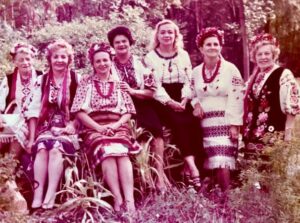Blog
My Grandmother – Ukrainian Fierce

This is my Ukrainian grandmother, Jennie (2nd from left). We called her “Nana.” She taught me how to make pierogis by hand, appreciate the artistry of painted eggs, how to polka, and a few “choice” phrases in Ukrainian.
This photo is with her dance troop. The embroidered black and red threads symbolized the wisdom and courage of generations, while red and white embroidery signified purity and happiness. I have this cherished outfit in my closet.
Nana was born in the U.S. and lived in Galicia, Poland between 1912 and 1931. She had to travel to Poland to get her delayed U.S. birth certificate and have the American consulate in Warsaw
issue her a passport home to her place of birth. All this sounds simple, but it took several years because of the countries involved, having delayed overseas documents with multiple authenticated signatures and seals, and all the back and forth for approval. This was before the days of any mail to small foreign towns, e-mail, and electronic document use.
Nana told her family that she was almost ready to give up at several points. She had been orphaned near the end of WW1 and her brother had been lost. He was approximately 10 years old and not found until years later in Paris.
Nana was lucky to finally get out in the early 1930s. Soviet dictator Joseph Stalin had a campaign of starvation known as the “Ukrainian Famine” during 1932-1933, killing almost 4 million Ukrainians. Ukraine also suffered dearly during Germany’s invasion during WW2 in the early 1940s. Hitler wanted more land for overcrowded Germany. (Ukraine was the breadbasket of Europe because of its very good farmland and climate.) We lost many family members during these atrocities.
Though she escaped Ukraine, Nana came back to the U.S. during the first few years of the Great Depression. She lived in Astoria and worked for the NY Telephone Co. cleaning toilets.
Astoria had a large Ukrainian population and she eventually met my Ukrainian grandfather, Michael. He came to the U.S. in 1912 and two years later, WW1 broke out stopping all immigration. “Undesirables” such as Eastern Europeans (Ukrainians), Southern Europeans, Asians, and others considered intellectually deficient, or those who “looked different” than Americans were not welcome. My grandfather was 14 when he immigrated to the U.S. when the window of immigration was only 2 years.
I have had many relatives who have lived in battle zones during the past century and have distant cousins that now live in Ukraine war zones. My heart goes out to all Ukrainians. I feel it will be highly likely their country and way of life will be destroyed.
Ukrainians have suffered but, as Nana did, they continue to exhibit great bravery, love of family, country, and democracy.
These are attributes that remind me of my grandmother who was spirited, feisty, brave, determined, and loyal. She taught me to keep my chin up.
I am Ukrainian Fierce.

